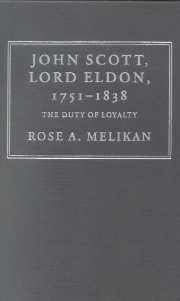Book contents
- Frontmatter
- Contents
- List of illustrations
- List of tables
- Preface
- List of abbreviations
- 1 A man of laws
- 2 An independent learned gentleman
- 3 A government retainer
- 4 Formal politics
- 5 Engagement
- 6 Setbacks
- 7 Resolution
- 8 Pater familias
- 9 Upright intentions
- 10 The King's man
- 11 The practice of patronage
- 12 Cut and thrust
- 13 A servant may serve two masters
- 14 Reform and revolution
- 15 The Speaker speaks
- 16 Lord Endless
- 17 Faithful defender
- 18 Twilight of the State
- Bibliography
- Index
- Plate Section
2 - An independent learned gentleman
Published online by Cambridge University Press: 07 August 2009
- Frontmatter
- Contents
- List of illustrations
- List of tables
- Preface
- List of abbreviations
- 1 A man of laws
- 2 An independent learned gentleman
- 3 A government retainer
- 4 Formal politics
- 5 Engagement
- 6 Setbacks
- 7 Resolution
- 8 Pater familias
- 9 Upright intentions
- 10 The King's man
- 11 The practice of patronage
- 12 Cut and thrust
- 13 A servant may serve two masters
- 14 Reform and revolution
- 15 The Speaker speaks
- 16 Lord Endless
- 17 Faithful defender
- 18 Twilight of the State
- Bibliography
- Index
- Plate Section
Summary
In his analysis of why men went into Parliament, Sir Lewis Namier has identified several different groups that together comprised the House of Commons in the late eighteenth century. The manner in which each group functioned was a result of their particular interests. For example, squires or country gentlemen typically lacked political ambition beyond the honour of membership in the national legislature. Accordingly, they remained aloof from party or faction. In contrast, professional men regarded a seat in Parliament as a means of advancing their careers. Lawyers could aspire to any of the several legal appointments available to a government, from borough recorder to Lord Chancellor of England. In Namier's analysis these two groups had little in common – the one anxious to avoid party intrigue, and the other conscious that from a judicious political alliance could come great professional rewards. In fact, at least a reputation for independence, the supreme virtue among Namier's country gentlemen, undoubtedly held some attraction for the lawyers, towards whom a deep and well-established hostility existed in the House. In earlier times a habit of poor attendance, and of claiming preaudience in the courts as a parliamentary privilege, had led to several formal and informal attempts either to exclude them completely or to prevent them from practising in the courts while Parliament was in session.
- Type
- Chapter
- Information
- John Scott, Lord Eldon, 1751–1838The Duty of Loyalty, pp. 20 - 37Publisher: Cambridge University PressPrint publication year: 1999



